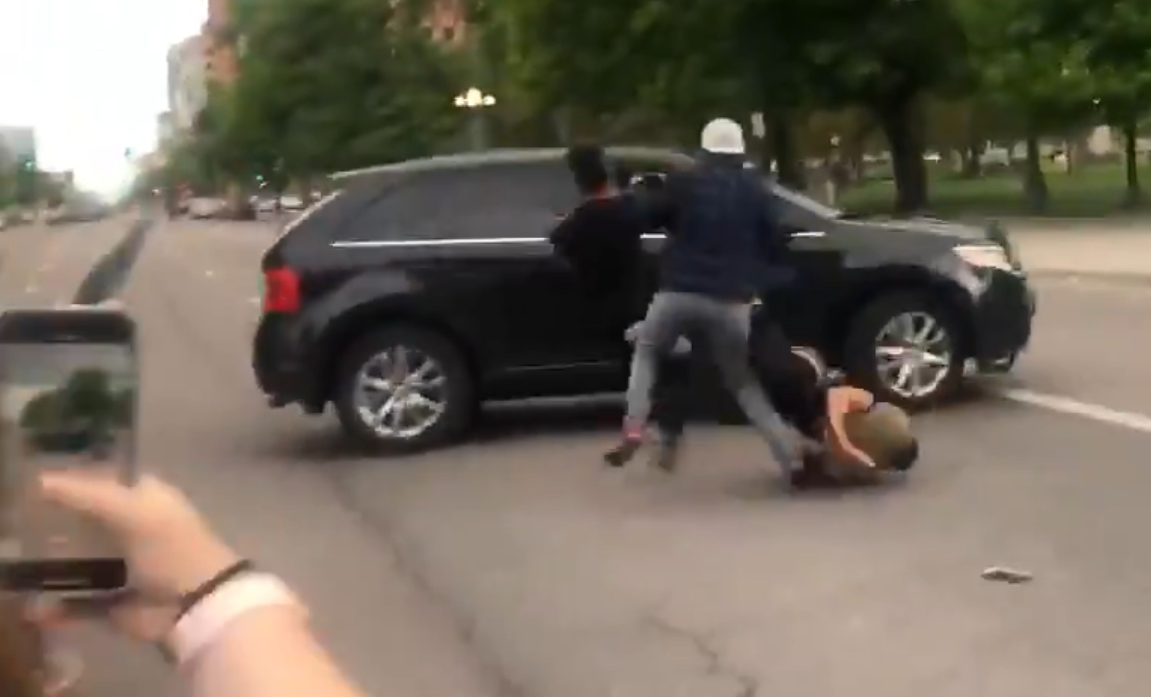

Audio By Carbonatix
Jennifer Watson, the 38-year-old who hit a protester with her car on the first day of the George Floyd protests in Denver last year, was found not guilty of misdemeanor assault in Denver County Court on July 9.
The same jury convicted Watson of reckless driving, which is a misdemeanor traffic offense in Colorado.
“It was always our position that Ms. Watson was acting in self-defense when she reacted to Mr. Max Bailey jumping on the hood of her vehicle and smashing the windshield of her vehicle,” says Watson’s attorney, Ryan Brackley, a former prosecutor with Denver District Attorney Beth McCann’s office.
The incident that led to the court case occurred around 7 p.m. on May 28, 2020, the first day of the racial justice protests in Denver, as a black SUV turned south onto Broadway from Colfax Avenue. A protester named Max Bailey jumped onto the hood of the car, which was being driven by Watson; when the SUV started accelerating, Bailey jumped off to the side, but Watson then veered toward Bailey and struck him. Bailey suffered some bumps and bruises, but no major injuries.
A video of the incident was posted to Twitter and quickly went viral. “This gut-wrenching video is eerily reminiscent of James Alex Fields, the man who murdered Heather Heyer in Charlottesville in 2017,” Senator Julie Gonzales wrote on Twitter.
During the trial, Brackley established a narrative about what Watson went through last year that was much different from what happened during that 2017 Charlottesville incident, however.
“We utilized an expert, a psychiatrist, to talk about fight, flight or freeze,” says Brackley, who points out that Bailey “admitted jumping up on the hood and then jumping off the hood. Admitted that he did it because Ms. Watson did not stop. They were there to stop traffic. He was less concerned about any other aspect other than we were there to stop.”
Watson’s windshield was smashed in the incident. In court, Bailey didn’t admit to breaking it. “I believe that was problematic for the jury,” Brackley says.
Since Watson still has to go through sentencing for the reckless driving conviction in early August, Brackley says he only feels comfortable commenting on the assault charge and verdict at this time. Bailey did not respond to a request for comment.
“This was a case we felt comfortable taking to a jury,” says Carolyn Tyler, a spokesperson for the DA’s office, “and we thank the jury for their service.”
This wasn’t the only instance of a car hitting someone during Denver’s George Floyd protests. On May 30, 2020, a Chevy sedan struck a police vehicle that was located at East 16th Avenue and Logan Street, injuring three police officers and a civilian. In June 2020, the Denver DA’s office charged Anthony Knapp, the alleged driver of the Chevy, with multiple counts of attempted first-degree murder and first-degree assault, among other charges. Knapp has pleaded not guilty to those charges; his next hearing is set for early August.
On July 25, 2020, an Aurora protest spilled out onto Interstate 225. The District Attorney’s Office for the 18th Judicial District decided not to charge a man who drove his Jeep through the protest; no one was hit by the car.